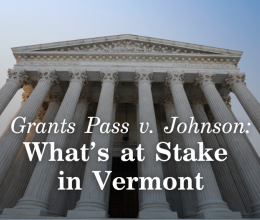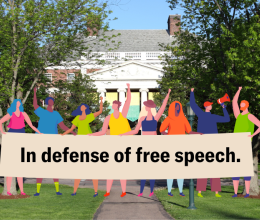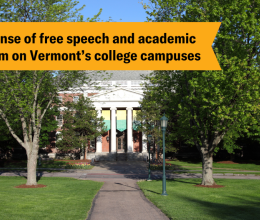Vermont resident Gregory Bombard filed a lawsuit on February 3, 2021, challenging a retaliatory arrest by a Vermont State Police Trooper in February 2018.
On February 9, 2018, in St. Albans, Trooper Jay Riggen stopped Gregory Bombard’s vehicle because he believed Bombard gave him the middle finger. Bombard denied making any such gesture but was harangued and detained by Riggen for several minutes of questioning. Once the initial stop and detention concluded, Bombard cursed and displayed his middle finger. Riggen then stopped Bombard again, ordered him from his vehicle, and arrested him for disorderly conduct, further berating Bombard throughout the arrest. Riggen also ordered the towing of Bombard’s car. Bombard was jailed for over an hour, cited to criminal court, and forced to navigate a criminal proceeding for nearly a year before the charge was dismissed.
Bombard asserts the initial stop not only violated his rights to be free from unreasonable seizure and false arrest, but that giving the “middle finger” to protest a police officer’s actions is free expression protected by the First Amendment of the U.S. Constitution and Article Thirteen of the Vermont Constitution.
Bombard’s stop is another example of the many ways in which Vermonters are overpoliced. A recently released Seguino and Brooks study, titled “Trends in Racial Disparities in Vermont Traffic Stops, 2014-19,” found that, in 2019, police in Vermont stopped residents at nearly four times the rate of the national average (321 drivers per 1,000 Vermont residents, compared to 86 drivers per 1,000 residents nationally) and Vermont State Police stops have increased nearly 50% since 2015. Furthermore, drivers in Vermont who were identified as Black or Hispanic were not only stopped at significantly higher rates relative to the national average, but were also searched at higher rates, despite being less likely than white drivers to be found with contraband. Studies of Vermont police data released in 2016, 2017, 2018, and 2020 all reached similar conclusions.
The ACLU of Vermont and its partners have called on the state to reimagine policing through a ten-part action plan. Recommendations include limiting the footprint of police in Vermont communities, such as through reducing discretion to cite or arrest for petty offenses like “disorderly conduct,” involvement in mental health crises, and authority to conduct “consent”-based searches.
Our free speech rights as Vermonters do not disappear simply because a police officer is offended. Gregory Bombard, like all of us, has constitutional protection to exercise his right to freedom of expression, to petition his government, and to protest police actions under the First Amendment and Article Thirteen of the Vermont Constitution. No public official, especially law enforcement, can punish him for exercising those rights.
The complaint can be downloaded below.






